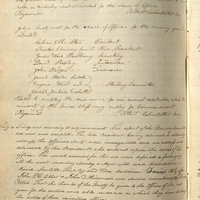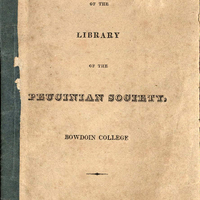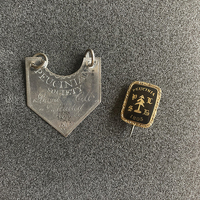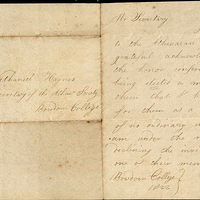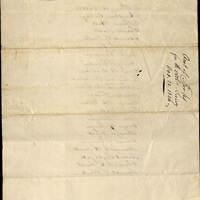
Literary Societies
Literary societies were integral to the social fabric of early American colleges, including Bowdoin. These clubs offered their members a chance to congregate, debate, and deliberate on important topics of the day. Bowdoin’s oldest literary society, the Peucinian Society was formed November 22, 1805, as The Philomathian Society, with the avowed purpose of “the attainment in habits of discussion and elocution.” A few months later, the group voted to change its name to something more distinct, adopting Peucinian, the Greek word for “pine-covered,” and the motto: Pinos loquentes semper habemus (We always have the whispering pines). Within a few years, the Athenaean Society was formed in 1808, purportedly by a disgruntled former Peucinian. This new debating and literary society was disbanded in 1811, revived in 1813, disbanded again in 1816 and revived again in 1817.
By the time the Class of 1825 arrived, both societies had dedicated spaces on the first floor of Maine Hall and extensive libraries purchased by and for the benefit of their own members. The societies competed vigorously for new members, and both groups developed certain reputations on campus, with the Peucinian Society attracting those with Federalist political leanings while the Athenaean Society appealed to Democrats. Based on academic ranks, it also appears that more serious scholars preferred the Peucinian Society, perhaps because of its larger library and more rigorous meeting schedule.
Peucinian Society Records, 1819-1831. From the Bowdoin College Archives (A04.36.01).
The July 18, 1823 notes of the Peucinian Society record the appointment of a special committee, composed of Thomas Ayer, John Badger, George Barrell Cheever, Henry Wadsworth Longfellow, and David Shepley, all members of the Class of 1825, to compile and publish a catalog of the Peucinian Society library. Longfellow would employ these same bibliographic skills years later when he became the Librarian of Bowdoin College.
Catalogue of the Library of the Peucinian Society, Bowdoin College. Hallowell, Maine: Goodale, Glazier & Co., printers, 1823.
The resulting catalogue of the Peucinian Society produced by the aforementioned committee. Many Longfellow scholars consider this his first publication. Its production foreshadowed his service as the Librarian of the College from 1829 to 1835.
Peucinian Society Pin and Badge. From the Bowdoin College Archives (A04.36.01).
This badge dates to the early 1820s, and would have been worn by a Peucinian Society member to identify himself as such. The pin, possibly of a later date, belonged to U. S. Congressman Samuel Page Benson, a member of the Class of 1825. Benson retained a far deeper connection to his alma mater than most of his classmates. His affinity for the Peucinian Society brought him back to campus to deliver the group’s commencement oration in 1839. He served as an Overseer for the college between (1839-1876), as the President of the Board (1860-1876), and as the Treasurer General of the Alumni Association (1870-1876). In the latter role, Benson managed to raise $20,000 (approximately $400,000 today when adjusted for inflation) to build Memorial Hall. The congressman was also the mastermind behind the Class of 1825’s 50th reunion. He proposed the idea of an in-person 1875 reunion to the college and then sent letters inviting each surviving class member to Brunswick. He was among the thirteen attendees of that historic Bowdoin event.
Athenaean Society Membership Requests and Responses, 1822. From the Bowdoin College Archives (A04.37).
Preserved in the records of the Athenaean Society are numerous letters from potential members either declining with regret or accepting with enthusiasm the invitation to join the club. Most members of the Class of 1825 who joined seem to have done so in 1822, during their sophomore year. Among those students accepting were Horatio Bridge and Jonathan Cilley, a future U.S. Navy Commodore and Congressman respectively. Declining that year were Cullen Sawtelle, son of a Chief Justice, and Alfred Mason, Nathaniel Hawthorne’s roommate.
List of Subscribers to Purchase Library Materials for the Athenaean Society, 1824. From the Bowdoin College Archives (A04.37).
Members of the literary societies used their collective purchasing power to subscribe to important new works of literature, history, and science, among other disciplines. Many members of the Class of 1825, including Nathaniel Hawthorne, the society’s most famous alumnus, pledged their support to buy Gregory’s Dictionary, Nicholson’s Encyclopedia, Middleton’s Cicero, Johnson’s Works, and several other important works from a dealer on October 21, 1824.

